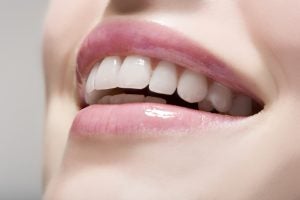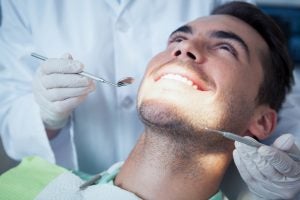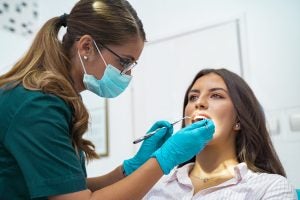-
Why it’s Important to tell your Dentist about Allergies or Medical Conditions

When you go to see your dentist, you do it to take care of your teeth. That being the case, there’s no need to talk to your dentist about the rest of your body, right? Wrong. There are some very important reasons to tell your dentist about allergies and other medical conditions you may have. Here are some medical issues you should be discussing with your dentist.
- Allergies: It’s particularly important to tell your dentist about any allergies to medications or a latex allergy, since dentists use medicines and latex products when treating you. Other allergies could be important as well. If you have skin that is reactive to certain non-precious metals, it could indicate a metal allergy. If you were to get a metal filling, it could become a complicated problem. Provide your dentist with a full list of your allergies, and if any new allergies arise, amend the list.
- Bacterial Infections: Bacteria from an infection can get into your blood and travel throughout the body, even affecting the mouth. An infection in your body can cause problems in your mouth, so your dentist needs to know about any infections and how they’re being treated.
- Heart Trouble: Your dental medication and procedures can have an impact on your cardiovascular health, but heart disease can also put you at a higher risk for oral issues like periodontal disease. If you have a heart condition or you’ve had a heart-related treatment or procedure, tell your dentist. Information your doctor needs to know includes things like artificial heart valves, transplant issues, heart surgery, pacemakers, and endocarditis.
- Pregnancy: If you’re pregnant, your dentist may want to change some things about treating you, like the frequency of x-rays.
- Chronic Conditions: Asthma and other breathing problems should be reported to your dentist. Epilepsy is another condition your dentist should be aware of. Essentially, any condition that might have an effect on medication your dentist uses in treating you should be reported.
- New Medication: Some medicines cause symptoms like decreased saliva production, tooth sensitivity, and trouble with your oral soft tissues. Any medication, whether over the counter or prescribed, is something your doctor should know about.
- Surgeries: Surgery increases your risk of infection, so let your doctor know if you’ve had any recent surgeries.
- Potentially Hazardous Habits: Lifestyle habits like drinking alcohol or using tobacco are important for your dentist to know. Regular drinking increases the risk of tooth decay, and tobacco use has been linked to many oral health issues. Be specific about your lifestyle choices because some things affect your mouth more than others. Chewing tobacco, for instance, has a different impact than cigarettes. Occasional drinking affects your mouth differently from daily drinking.
At Park 56 Dental Group, we offer pediatric, prosthodontics, endodontics, oral surgery, Invisalign®, emergency, and sedation dentistry, all at the highest level of treatment. We serve the Midtown, Central Park, Upper East Side, Park Avenue, and all surrounding Manhattan and New York areas, with a patient-centered practice that has hours to fit your schedule. Schedule your complimentary consultation today by contacting us online or calling us at (212) 826-2322.
-
Dental Advice for Parents

When you’re a parent, your child’s health is your top priority. That’s why parents know how important it is to teach children good dental habits. If you’re a new parent, you probably have many questions about dental care for your child. Don’t worry, our pediatric dentistry practice is one of the reasons we’re the best dentist in NYC and we have the answers you need.
- How can I help my child establish good dental habits? The best thing you can do is to be a good role model. Teach your children to brush and floss by modeling those behaviors and make it part of your family’s daily routine. Teach them how much toothpaste to use, how to floss and use mouthwash, and why it’s important to visit the dentist regularly. Make brushing fun, letting your kids pick their own toothbrushes to make it more appealing. Consider a toothbrush with a musical timer that lets kids know how long to brush.
- When should children start brushing and flossing? Before your baby’s first tooth even emerges, you should be caring for their dental health. Wipe little gums with a clean, damp washcloth to remove bacteria, and when your baby gets teeth, brush them with an infant toothbrush. Use very little toothpaste, only about as much as a grain of rice, to minimize any toothpaste being swallowed. When your child has two teeth that touch, begin flossing them. Children should learn how to spit when brushing when they’re about 2, and children younger than 8 should always be supervised to make sure they don’t swallow the toothpaste.
- What’s the best diet advice for a healthy mouth? First, never put a baby to bed with a bottle, whether juice, formula, or milk. Limit sugary foods and drinks to prevent tooth decay, and encourage your child to drink water and eat a diet full of vegetables and fresh fruit. Cheese is also a good snack, because it contains calcium important for tooth enamel and stimulates saliva to help wash unwanted sugars off of the teeth.
- When should my child see a dentist for the first time? According to the American Dental Association (ADA) children should see a dentist by their first birthday. The dentist will explain proper brushing and flossing techniques and do a checkup while your baby sits on your lap. After that, your child should have dental checkups twice a year. Starting dental visits early helps get your child comfortable with the dentist so there will be less anxiety in later years.
If you’re looking for a pediatric dentist, choose the best dentist in NYC. At Park 56 Dental Group, we offer pediatric dentistry, along with our other services, at the highest level of treatment. We serve the Midtown, Central Park, Upper East Side, Park Avenue, and all surrounding Manhattan and New York areas, with a patient-centered practice that has hours to fit your schedule. Schedule your complimentary consultation today by contacting us online or calling us at (212) 826-2322.
-
Foods and Drinks that Erode Teeth

You try to stick to a healthy diet, avoiding sugary sodas and sticky candies that can damage your teeth. However, sometimes even healthy foods can cause tooth erosion. It pays to be mindful of the signs of eroded tooth enamel and avoid foods that can negatively impact the health of your teeth.
First, what are the symptoms of tooth enamel erosion? You might notice that your teeth feel sensitive when you eat or drink something hot or cold. You might also notice that your fillings or even your teeth have changed color. If your enamel erodes to an extreme degree, you might lose a tooth or develop an abscess. So, what foods should you avoid to prevent these problems?
- Citrus Fruit: The high acid content in citrus can damage your teeth. In fact, even things with citrus flavoring can wear down your enamel.
- Tomatoes: Tomatoes are good for your body, but they can be rough on your teeth. This is because they’re acidic. If you eat tomato sauce on pasta, you’re doing your teeth a double disservice, because the tomatoes break down your enamel and the carbs in pasta feed cavity-causing bacteria.
- Dried Fruits: Even though it’s nutrient-dense, dried fruit can damage your teeth. It’s sticky, and has sugar, so if you don’t immediately get all that sticky fruit off of your teeth, the sugar will erode your enamel.
- Carbonated Beverages: Even when they’re sugar free, soft drinks have carbonation that can wear away your enamel. You’re better off with unsweetened tea or water, but if you do drink soft drinks, don’t brush immediately. You might think that cleaning the soda off of your teeth immediately is a good idea, but brushing after your enamel has been weakened by carbonation can erode it further.
- Pickles: Because of the acid required for the pickling process, pickles can cause staining and tooth erosion. Some pickles also have sugar, which makes them even more likely to cause cavities.
- Wine: Both white and red wine have enamel-softening acid, but red wine also contains compounds called tannins that can dry your mouth and stain your teeth.
- Sports Drinks: These beverages are high-carb, sugary, acidic, and thick enough to stick to your teeth.
- Crackers: Because they’re refined carbohydrates, crackers can cause inflammation in the body. Crackers also stick to your teeth, which can promote tooth decay.
- Sugar: Of course, you’ve known since childhood that sugar causes cavities. It’s important to note, however, that sugar isn’t only found in sweet treats, but also in processed foods.
At Park 56 Dental Group, we offer pediatric, prosthodontics, endodontics, oral surgery, Invisalign®, emergency, and sedation dentistry, all at the highest level of treatment. We serve the Midtown, Central Park, Upper East Side, Park Avenue, and all surrounding Manhattan and New York areas, with a patient-centered practice that has hours to fit your schedule. Schedule your complimentary consultation today by contacting us online or calling us at (212) 826-2322.
-
How to Overcome Dry Mouth

Does your mouth feel uncomfortably dry? Many adults suffer from dry mouth, known medically as xerostomia or hyposalivation, which happens when the salivary glands don’t produce enough saliva. It’s a problem, because saliva is necessary for washing away debris and protecting your mouth from harmful acids. Without enough saliva, the mouth is vulnerable. Causes of dry mouth vary, but sometimes home remedies can provide some relief.
First, let’s discuss possible causes of dry mouth. It could be as simple as dehydration, or it could be the result of a medication you’re taking. Smoking can cause dry mouth, as can drinking alcohol. Sometimes, though, dry mouth is the result of a medical condition like diabetes, kidney disease, Parkinson’s disease, immune/autoimmune disorders, anxiety or depression, anemia, or nutritional deficiency. If you think your dry mouth might be the result of an illness, see a doctor to rule it out before trying these home remedies.
- Hydrating can alleviate dry mouth. Drinking water can help with mild dehydration, and it can also rinse your mouth if your saliva isn’t getting the job done. Limit your caffeinated and alcoholic beverages, as these can be dehydrating.
- Mind your dental products. Don’t choose a mouthwash that contains mouth-drying alcohol. Instead, look for one created to help alleviate dry mouth. Ask your dentist if a prescription fluoride toothpaste, rinse, or gel might be beneficial.
- Try sugar free candy or gum. Chewing gum or sucking on hard candy can increase the flow of saliva. Just be careful to choose sugar-free products, because a dry mouth is more susceptible to cavities. Look for gum with the ADA seal of acceptance.
- Use a humidifier to moisten your mouth. Breathing in dry air doesn’t help a dry mouth, so use a humidifier, especially when you’re sleeping.
- Breathing through your nose may help. Breathing through your mouth can cause it to become dry, so if you’re having trouble breathing through your nose because of congestion or allergies, talk to your doctor.
- Don’t smoke. Smoking cigarettes actually slows down saliva production. For a healthy mouth, avoid all kinds of tobacco products.
- Try some over-the-counter products for dry mouth. There are many different saliva substitutes on the market, from sprays to rinses to specially-formulated toothpastes. Just be aware that these may not be a good long-term solution.
- Take your vitamins. Vitamin supplements, particularly vitamin C and vitamin B complex, can help with inflammation and boost your immune system, which may help alleviate dry mouth. There are also a number of herbal remedies for dry mouth, including aloe vera, ginger, hollyhock root, and marshmallow root.
Whenever you have a question about your oral health, it’s good to have a dentist you can trust for answers. At Park 56 Dental Group, we offer pediatric, prosthodontics, endodontics, oral surgery, Invisalign®, emergency, and sedation dentistry, all at the highest level of treatment. We serve the Midtown, Central Park, Upper East Side, Park Avenue, and all surrounding Manhattan and New York areas, with a patient-centered practice that has hours to fit your schedule. Schedule your complimentary consultation today by contacting us online or calling us at (212) 826-2322.
-
Oral Cancers of Which to Be Aware

You know that visiting your dentist regularly can help protect against cavities, but did you know that these regular checkups can also help protect you from cancer? During a routine dental visit, your dentist will screen you for signs of oral cancer. This is important, because the earlier cancer is detected, the easier it is to fight. Do you know about the different types of oral cancers?
- Lip Cancer: The most common oral cancer, lip cancer primarily affects men. People sometimes miss the common symptoms of lip cancer because they think it’s a cold they can’t shake or a toothache. Be vigilant for signs of lip cancer, including a sore on the lip that doesn’t heal, persistent lip pain or numbness, a lump, thickening, or white or red patch on the lip, or a neck mass. Surgery is often the first step in treating lip cancer, but it’s also treated with radiation therapy, chemotherapy, and targeted drug therapy.
- Mouth Cancer: This cancer can develop in any part of the mouth, including the tongue, gums, and lips. As with other types of oral cancer, symptoms can seem like a cold that won’t go away. They also include continual tongue or jaw pain, a thickening or lump inside the mouth, a red or white patch on the gums, tongue, tonsil, or the mouth’s lining, or trouble swallowing or chewing. It might be hard to move your jaw or tongue. If surgery is performed to remove a tumor from the mouth, it may be necessary for the surgeon to reconstruct part of the face afterward. Doctors also use radiation, chemotherapy, immunotherapy, and targeted drug therapy to fight mouth cancer.
- Tongue Cancer: Tongue cancer forms in the front two-thirds of the tongue. If cancer forms in the back third of the tongue, it’s considered a kind of head and neck cancer. In addition to the typical oral cancer symptoms, tongue cancer causes tongue or jaw pain, a thickening or lump in the mouth, a sore throat, or the feeling that something is stuck in the throat, difficulty chewing or swallowing, or a white or red patch inside the mouth. Sometimes tumor resection for tongue cancer can be minimally invasive. Chemotherapy, radiation, and targeted drug therapies are also treatment options.
How can you reduce your risk of oral cancers? A healthy lifestyle can help. Don’t smoke or use any other tobacco products, and limit your alcohol consumption. Maintaining a healthy weight, eating a nutrient-dense diet, and protecting yourself from UV rays are all things that help your overall health and lower your risk of oral cancer.
At Park 56 Dental Group, we offer pediatric, prosthodontics, endodontics, oral surgery, Invisalign®, emergency, and sedation dentistry, all at the highest level of treatment. We serve the Midtown, Central Park, Upper East Side, Park Avenue, and all surrounding Manhattan and New York areas, with a patient-centered practice that has hours to fit your schedule. Schedule your complimentary consultation today by contacting us online or calling us at (212) 826-2322.
-
What is General Dentistry?

When following the recommended schedule, you’ll see your dentist twice a year. That’s more than you see other doctors, because while most doctors tend to the sick, dentists are primarily concerned with preventing problems. Most dentists practice general dentistry, and at a routine visit the dentist- with the help of dental assistants- will examine the mouth, provide a professional cleaning, and discuss the patient’s health and oral hygiene. But that’s not the entire scope of general dentistry. Let’s take a look at all the things that general dentists do.
- Preventive services are the mainstay of a general dentistry practice. Regular exams and professional teeth cleanings help patients maintain good oral health, as do preventive treatments like dental sealants. The dentist can also fit patients with active lifestyles for custom-made mouthguards.
- When there’s a problem, dentists provide restorative services. One of the most common restorative treatment is a filling. The dentist removes tooth decay and puts a filling in the damaged tooth. However, that’s not the only restorative procedure provided by general dentists. They can also provide treatment for dental trauma, like when a tooth has been broken, knocked out, or loosened. Dentists can also diagnose and treat tooth pain and gum disease, offer treatment for missing teeth, place crowns or bridgework, and fit patients for dentures. Some general dentists can also perform advanced treatments like root canal therapy, orthodontics, and dental implants.
- Often, general dentists perform cosmetic procedures to help improve their patients’ smiles. Teeth whitening, cosmetic bonding, and even porcelain veneers can be provided by your dentist’s office.
- General dentists are concerned with their patients’ overall health. Your oral health impacts and reflects the health of your body. For instance, infections in your mouth can impact your cardiovascular health, and people with diabetes are more susceptible to periodontal (gum) disease. General dentists can identify issues with your teeth than can have an impact on your health and offer treatment or referral when necessary. One condition dentists can screen for is obstructive sleep apnea, which can sometimes be treated with an oral appliance. General dentists are also qualified to provide nutritional counseling, advice about tobacco cessation, and general health and wellness information. They can also screen for oral cancer.
What qualifications are required for general dentistry? Dentists must successfully complete their undergraduate education and four years at an accredited dental school. They then have to fulfill testing and continuing education requirements of state licensing boards. Dentists may have the initials DMD or DDS following their names, but they all have the same education and training.
At Park 56 Dental Group, we offer pediatric, prosthodontics, endodontics, oral surgery, Invisalign®, emergency, and sedation dentistry, all at the highest level of treatment. We serve the Midtown, Central Park, Upper East Side, Park Avenue, and all surrounding Manhattan and New York areas, with a patient-centered practice that has hours to fit your schedule. Schedule your complimentary consultation today by contacting us online or calling us at (212) 826-2322.
-
Dental Terms to Know

When you visit the dentist, you may sometimes hear terms you don’t understand. This is not unusual, because dentists often use very specific medical terminology that is unfamiliar to most patients. If you aren’t sure what the dentist is talking about, you should always ask questions, so that you’ll understand what’s going on with your mouth. In the meantime, here’s a list of common dental terms that are good to know.
- Abrasion: Tooth wear caused by forces other by eating.
- Abutment: Tooth or implant supporting a dental prosthesis.
- Anesthesia: General anesthesia is a controlled state of unconsciousness, intravenous sedation is depressed consciousness that’s medically controlled, and local anesthesia, also called regional, is the loss of sensation without the loss of consciousness.
- Arch: An upper or lower denture.
- Bicuspid: Premolar tooth with two cusps.
- Bilateral: Occurring on both sides.
- Bonding: Composite resin applied to a tooth to change its color or shape.
- Calculus: Hard deposit of mineralized material on crowns or the roots of teeth.
- Composite: Restorative material made of a mixture of parts.
- Dentin: The inner layer of the tooth, protected by enamel and encasing the tooth’s pulp and nerve.
- Dry mouth: When the mouth doesn’t produce enough saliva- untreated, it can lead to increased levels of tooth decay and mouth infections.
- Enamel: Hard outer layer of the tooth, made of minerals.
- Excision: Surgically removing bone or tissue.
- Extraction: Removing a tooth or tooth parts.
- Fluoride: A natural mineral that makes the tooth’s exterior resistant to decay.
- Implant: A permanent replacement for missing teeth, surgically placed in the jawbone to anchor replacement teeth, a dental bridge, or dentures.
- Invisalign®: Clear, removable, dental aligners for mild to moderate orthodontic issues.
- Laser dentistry: Lasers are used for tooth decay removal, gum disease treatment, root canal therapy, and teeth whitening.
- Oral surgery: Dental specialty that corrects problems or damage to the teeth, mouth, and jaw.
- Periodontal disease: Gum disease. Gingivitis is an early stage.
- Plaque: Sticky film that forms on teeth as bacteria breaks down that causes decay if not removed.
- Radiograph: X-ray
- Root: Portion of the tooth located in the socket.
- Scaling: Removal of plaque, calculus, and stain from teeth.
- Sealant: Plastic resin applied to the biting surfaces of molars to prevent caries.
- Sedation dentistry: The use of medication to help patients relax during dental procedures.
- Tartar: Hardened plaque that can only be removed by scaling.
- TMJ: Temporomandibular joint, the hinge mechanism between the base of the skull and the lower jaw.
- Veneer: Tooth-colored material attached to the tooth surface.
At Park 56 Dental Group, we offer pediatric, prosthodontics, endodontics, oral surgery, Invisalign®, emergency, and sedation dentistry, all at the highest level of treatment. We serve the Midtown, Central Park, Upper East Side, Park Avenue, and all surrounding Manhattan and New York areas, with a patient-centered practice that has hours to fit your schedule. Schedule your complimentary consultation today by contacting us online or calling us at (212) 826-2322.
-
How Often Should You Be Going to the Dentist?

How often do you see your dentist? About one hundred million Americans skip out on regular dental checkups, even though seeing a dentist regularly is vital for good oral health. Your dentist probably encourages you to come twice a year, but is that really necessary?
Truthfully, there’s little research supporting the twice a year recommendation. So, how often should you be going to the dentist? It depends on a few factors. Some people need to go to the dentist more than twice a year. This high-risk group includes pregnant women, smokers, people prone to plaque build-up or cavities, those who have gum disease or diabetes, and anyone with a weak immune response. People who practice excellent oral hygiene and show no signs of gum disease or cavities may be able to get away with going to the dentist less often than twice a year, but that is something to discuss with the dentist.
Even if you’re diligent about brushing twice a day and flossing daily, seeing your dentist regularly is important. That’s because dentists and dental hygienists can spot problems you can’t see and prevent them from becoming major issues. When you go to the dentist, here’s what you can expect:
- X-rays: At the beginning of your appointment, the dental hygienist will take any x-rays you need so that the dentist can look at them while your teeth are being cleaned.
- Cleaning and Polishing: Using scalers and other dental tools, the hygienist will gently remove plaque and tartar from tooth surfaces and just below the gum line. Your teeth will then be polished with a paste, and the hygienist will floss between your teeth. During the cleaning, the hygienist will let you know if there are any areas to which you need to pay more attention when brushing and flossing, and instruct you on proper brushing and flossing techniques.
- Oral cancer screening: By examining your palate, tongue, throat, inside of cheeks, and other parts of your oral cavity and feeling the outside of your jaw and throat, your dentist will be able to spot any signs of cancer. Because oral cancer is most successfully treated when detected early, this screening is very important.
- Cavity detection: The dentist will examine your teeth for cracks, chips, decay or other damage, and the hygienist will chart any teeth that require treatment.
- Gum assessment: Your dentist will check for signs of gingivitis or periodontal disease. Gum disease is reversible when detected in the early stages.
- Dental appliance check: Because dental appliances don’t last forever, the dentist will check to see if anything needs replacing.
At Park 56 Dental Group, we offer pediatric, prosthodontics, endodontics, oral surgery, Invisalign®, emergency, and sedation dentistry, all at the highest level of treatment. We serve the Midtown, Central Park, Upper East Side, Park Avenue, and all surrounding Manhattan and New York areas, with a patient-centered practice that has hours to fit your schedule. Schedule your complimentary consultation today by contacting us online or calling us at (212) 826-2322.
-
Celebrities Who Have Had Cosmetic Dentistry Procedures

The first stanza of a poem by Phyllis McGinley, called “Reflections Dental” reads:
How pure, how beautiful, how fine
Do teeth on television shine!
No flutist flutes, no dancer twirls
But comes equipped with matching pearls.
Gleeful announcers all are born
With sets like rows of hybrid corn.Have you noticed that every celebrity seems to have perfect teeth? Are they born that way? Actually, many celebrities choose cosmetic dentistry procedures to make them look more perfect. Did you suspect the stars on this list of improving their pearly whites?
- Tom Cruise: His winning smile is the result of whitening, straightening, and an upgrade to porcelain veneers.
- George Clooney: Although his smile was always gorgeous, his history of tooth grinding shortened his teeth until they were lengthened with veneers
- Gary Busey: Speaking of having teeth lengthened, Gary Busey opted for outsized veneers after an accident.
- Mike Tyson: He had a gold tooth and a gap, but then he had the gap narrowed and traded in the gold for veneers. Surprisingly, because it was his signature look, he had the gap added back!
- Hillary Duff: After chipping a tooth on a microphone during a show, she decided to get a full set of veneers instead of a single repair.
- Ben Affleck: He used to have an overbite, but after lengthening, porcelain veneers, crowns, and whitening, he’s got a dazzling smile.
- Victoria Beckham: Posh Spice’s teeth used to be less than posh, but she’s had them fixed with a set of veneers.
- Jim Carrey: He once had a broken tooth capped, and he removed that cap for his snaggle-toothed Dumb and Dumber smile. Since then, he’s gone for veneers.
- Morgan Freeman: He was successful when he had gapped teeth, but in recent years he’s gotten whitening and used veneers to straighten his teeth.
- Miley Cyrus: The slightly crooked teeth of this child smile were replaced with veneers once she grew up.
- Catherine Zeta-Jones: Teased as a child over crooked teeth, she fixed her alignment with orthodontics and upgraded her smile with veneers.
- Chris Rock: The success of Lethal Weapon allowed him to spend $150,000 on a new smile!
- Zac Efron: His charming gap-toothed grin has been replaced with the perfection of veneers, but he wore false teeth to play Bundy.
- Nicolas Cage: He had two teeth pulled for the 1984 film “Birdy” but has since gotten a full set of veneers.
- 50 Cent: Shot in the face in 2000, he lost a tooth a gained a gap. He later fixed his teeth with whitening and veneers.
Do any of these names surprise you? Here’s some good news: the same procedures used by celebrities are available for you. At Park 56 Dental Group, we offer dental care, including smile restoration, providing the highest level of treatment. We serve the Midtown, Central Park, Upper East Side, Park Avenue, and all surrounding Manhattan and New York areas, with a patient-centered practice that has hours to fit your schedule. Contact us online or call us at (212) 826-2322.
-
Why You Should be Excited about Going to the Dentist

When was the last time you felt genuinely excited about going to the dentist? For many people, it’s nothing but a chore. For others, dentist visits are downright stressful. If you have had a bad experience, dealt with rude dentists, or suffered through painful appointments in the past, switch to Park 56 Dental. Here’s how we make our patients excited to visit the dentist.
- We improve your oral health: Routine dentist visits are the best way to catch and treat dental problems early. Stop worrying if that minor toothache is going to get any worse, and have it checked out! While you’re here, we’ll look for hidden problems using X-rays and treat developing concerns right away. Exams also include an oral cancer screening for your peace of mind.
- Our dental services improve your overall health: Do you know about the connection between oral health and cardiovascular disease? Taking good care of your teeth and gums can even decrease the risk of diabetes, dementia, rheumatoid arthritis, and other seemingly unrelated conditions. Who doesn’t get excited about having a clean bill of health?
- Our routine cleanings and oral exams save you money: While restorative dentistry can improve your smile, it’s best to avoid cavities, staining, and tooth loss if at all possible. Affordable, preventative dental care can stop problems before they start, saving you the time, hassle, and expense of restoring your smile later on.
- We provide dental advice: Not sure what toothbrush you should buy for your sensitive gums? Want recommendations to keep your stain-prone teeth looking whiter? Ask for personalized advice at your next dentist appointment.
- You’ll leave our office with clean teeth and fresh breath: No amount of brushing and flossing can remove tartar, the hard, brown substance that forms if plaque accumulates in your mouth. Tartar stains your teeth and can cause bad breath, but the only way to remove it is with a professional dental cleaning. You’ll love how clean your mouth feels and how fresh your breath smells when you leave our office!
- We accept most dental insurance plans: If you have dental coverage, put it to good use by visiting us twice a year. You’ll get satisfaction out of knowing you’re maximizing your benefits. We also accept major credit cards and Care Credit for any services not covered by insurance, with flexible payment options available if needed.
- You’ll spend time in our patient-centered, spa-like office: We cater to a clientele that appreciates personalized, quality dental care. Expect our knowledgeable, compassionate dentists to meet your individual needs, whether you’re naturally excited to be here or struggle with dental anxiety.
There’s a reason Park 56 Dental has been voted NYC’s best dentist! Our services are ideal for the whole family. Visit us for general and cosmetic dentistry, prosthodontics, endodontics, oral surgery, Invisalign, emergency services, and sedation dentistry. When you’re ready for your complimentary consultation, please call us at (212) 826-2322 or contact us online.
RECENT POSTS
categories
- Uncategorized
- Cosmetic Dentistry
- Veneers
- Healthier Teeth
- Teeth Whitening
- Dental Health
- Video
- Dental Emergencies
- Invisalign
- Dental Implants
- Root Canal
- Sedation Dentistry
- Infographic
- Dental Crowns and Bridges
- Dental Anxiety
- Gum Disease
- COVID-19
- Bad Breath
- New York Dentist
- Cut out sugar
- General Dentistry
- Oral Health
- Oral Cancer
- Dry Mouth
- Gum Health
- Toothache
- Dental Sealants
- Cavities



